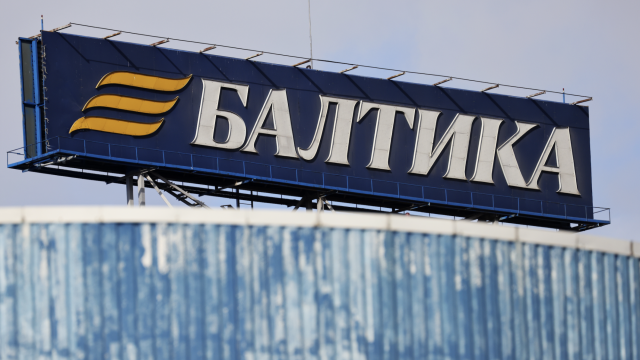The clouds over Russia’s burgeoning e-commerce sector are swelling, but that is a good thing as cloud services are expanding on the back of new regulations that are feeding an already fast growing business.
Russia's cloud services market has been boosted by a recent requirement that Russian citizens' personal data should be stored within the country as part of the Kremlin’s ongoing drive to sanction-proof the Russian economy.
Although Russia's total share of the global cloud storage market is still under 1 percent, the sector is undergoing a boom as foreign companies hire local service providers to store Russians' data, a recent study by iKS-Consulting revealed.
In 2018, the country's cloud services segment grew by 25 percent year-on-year to 68.4 billion rubles ($1.1 billion), and about 70 percent of that is accounted for by SaaS - Software as a Service, or programmes that are operated from the cloud rather than being installed on a personal computer.
Meanwhile, Russia's cloud services industry is projected to grow by roughly 23 percent a year over the next few years and could reach 155 billion rubles ($3.4 billion) by the end of 2022, according to iKS-Consulting.
Foreign customers' share has been growing and currently stands at 5.1 percent for SaaS and 2.2 percent for the IaaS (Infrastructure as a Service) segment, which covers various types of cloud data storage.
The controversial Yarovaya data storage law, enacted on September 1, 2015, led to the blocking of international recruitment network LinkedIn, which refused to comply and put other global tech giants operating in Russia in a tough spot.
And while the global tech giants are still playing tug-of-war with the government, smaller companies are looking for ways to store Russians' personal data within the country.
Under the law, companies don't necessarily have to physically store data on servers at local data centres. To comply with the law, it is enough to sign an agreement with a local company providing cloud storage services.
In addition, some foreign customers are interested in Russian cloud software, such as accounting programmes and virtual automated telephone services.
Foreign video services have also been recently taking advantage of Russian cloud services. YouTube and Netflix have content delivery networks (CDNs) in Russia, which allows them to store videos locally, saving time and money on delivery of content to locally based users.
"Foreign customers often contract local cloud service providers when opening an office in Russia," Maxim Berezin, business development director for cloud services at KROK, was quoted as saying by RBC. "In those situations, companies have limited or no IT personnel, but they need to quickly launch an infrastructure in compliance with the requirements of the regulator."
He added that using cloud services could also be a company's global policy to be pursued in all markets where it is present.
Among KROK's recently added foreign customers are DHL and several undisclosed operators in the logistics and retail segments.
Foreigners active
Meanwhile, foreign providers of cloud services have also been more active in the Russian market lately, such as Google Cloud, the global online giant's division focused on cloud services, according to iKS-Consulting.
Chinese companies, such as Alibaba and Huawei, have also reportedly been stepping up their cloud operations in Russia, but they mostly operate in partnership with local firms.
Despite the recent growth, Russia's share in the global market of cloud services is currently insignificant, at just under 1 percent. The share has the potential to triple over the next few years, but there are factors hampering the progress.
Among these are the government's overall stance on the internet, focused on isolationism and tighter regulation of the web, Yuri Samoilov, general director of DataLine, was quoted as saying by RBC.
"In addition, foreign companies have enough potential providers of cloud services, and Russian companies don't have any noticeable competitive advantages in comparison with the market's leaders, such as Amazon and Microsoft," he said.
Meanwhile, control of the web aside, Russian authorities could still do something to foster the development of the local cloud services segment, such as lowering taxes and wholesale electricity prices, which would lower costs and make local companies more competitive in the global market, concluded Maxim Semenikhin, managing director of Selectel.
This article is part of bne IntelliNews’s coverage of technology, blockchain, fintech, cryptocurrencies and the new economy.
Read the latest issue of bneTech here
This article first appeared in bne IntelliNews.
A Message from The Moscow Times:
Dear readers,
We are facing unprecedented challenges. Russia's Prosecutor General's Office has designated The Moscow Times as an "undesirable" organization, criminalizing our work and putting our staff at risk of prosecution. This follows our earlier unjust labeling as a "foreign agent."
These actions are direct attempts to silence independent journalism in Russia. The authorities claim our work "discredits the decisions of the Russian leadership." We see things differently: we strive to provide accurate, unbiased reporting on Russia.
We, the journalists of The Moscow Times, refuse to be silenced. But to continue our work, we need your help.
Your support, no matter how small, makes a world of difference. If you can, please support us monthly starting from just $2. It's quick to set up, and every contribution makes a significant impact.
By supporting The Moscow Times, you're defending open, independent journalism in the face of repression. Thank you for standing with us.
Remind me later.






